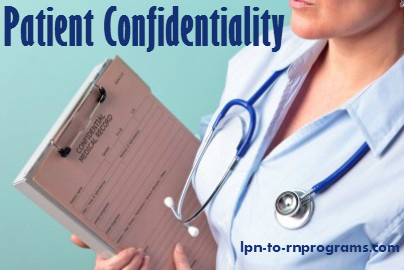Patient Confidentiality: Not an Absolute Right
Patient confidentiality has remained one of the most crucial issues in the nursing profession. This is in view of the fact that we listen to our patients’ stories and we spend more time with them. Hence, we know what they are going through.
When you first entered a nursing school, some of the basic principles taught were about patient confidentiality. One of these is that we should never discuss anything about our patient with someone who is not directly involved in patient care may it be to our family members, friends and even colleagues. Yes, even with our colleagues. Why? Because there are instances that it may be overheard by other people. On the other hand, to maintain confidentiality, we are instructed not to read the chart of another patient who are not assigned to us.
When you started your career as a nurse, you are faced with a bigger responsibility. You are now expected to deal with more complex situations – complex situations which do not merely involve putting nursing theories into practice. Rather, it involves you weighing the benefits of the actions you are going to take and considering the possible consequences of these actions.

With this, Bioethics plays a very important role in our profession. Knowing the principle of confidentiality will not just be beneficial to your patient but it will also allow you to protect your hard-earned license. Remember that the effect of a single mistake may possibly take a lifetime. Thus, as a registered nurse, we should know the dos and don’ts regarding disclosure of patient information.
First, you have to know that confidentiality is your patient’s right. Hence, before you can disclose any information, you have to obtain an informed consent. Written consent is advisable but there are instances that verbal consent will do. However, you also need to know that this right is not absolute. There are times that it may be waived for their welfare and for the sake of other people who are involved in their care.
Sometimes, we unconsciously breach this right to confidentiality. There are circumstances that we discuss our patient’s case to our colleagues or even use their case for our case studies. However, its effect is negligible and rarely brings harm to our patients. The benefits of doing this are attributed to knowledge-gaining as we discuss the case and not the patient’s personal life.
However, whatever purpose we have for disclosing patient information, we should always put our patient’s welfare first. We should keep in mind that part of our duty is to obtain informed consent. As we do this, we should consider our patient’s level of understanding, age and ability to comprehend. Our explanation should be brief and concise. We do not need to go into thorough details as this may not help our patients and may be overwhelmed with information that we will provide.
- One of the most common situations is in the case of communicable disease. Disclosing information to other members of the health team in case of communicable disease such as sexually transmitted disease or tuberculosis is a way of protecting others. Through this, we are giving precautions to them. After knowing this, they will be able to observe precautionary measures such as the use of mask and gloves, frequent hand washing and proper handling of specimens. Disclosing information may also help in the diagnosis and management of the disease.
- An uncommon case where patient confidentiality is waived is when genetic disorders are diagnosed. Some patients allow health practitioners to disclose information to their families about their health especially if it is hereditary. This serves as a preventive measure since it allows early diagnosis and prevention for at-risk family members. However, disclosing information in this case still depends on the patient’s preference and not on the nurse’s or physician’s personal decision.
- Nevertheless, patient confidentiality is also waived in case of abuse either child/elder abuse or domestic violence. Once you suspect that child abuse has occurred, it is necessary to ask for assistance from authorities for them to take legal actions. Once you keep silent, you could expect that same thing will happen over and over again.
- Another instance where patient information is disclosed to others is in case that our patient is a minor. Minors are considered to be”legally” incompetent with respect to decision-making. They may not be able to have a sound decision for their health and welfare. Hence, it is necessary to disclose their information to their parents and guardian to help them decide.
Maintaining patient confidentiality is really a great challenge for nurses and other healthcare professionals considering that they are expected to work as a team. However, though it may seem difficult to keep, always put our patient’s welfare first. If it will bring significant benefits to them, then you have enough reason to do it. Keep in mind that a single word that you utter that breaches confidentiality will take a long-term effect on your career.


Comments
Patient Confidentiality: Not an Absolute Right — No Comments
HTML tags allowed in your comment: <a href="" title=""> <abbr title=""> <acronym title=""> <b> <blockquote cite=""> <cite> <code> <del datetime=""> <em> <i> <q cite=""> <s> <strike> <strong>